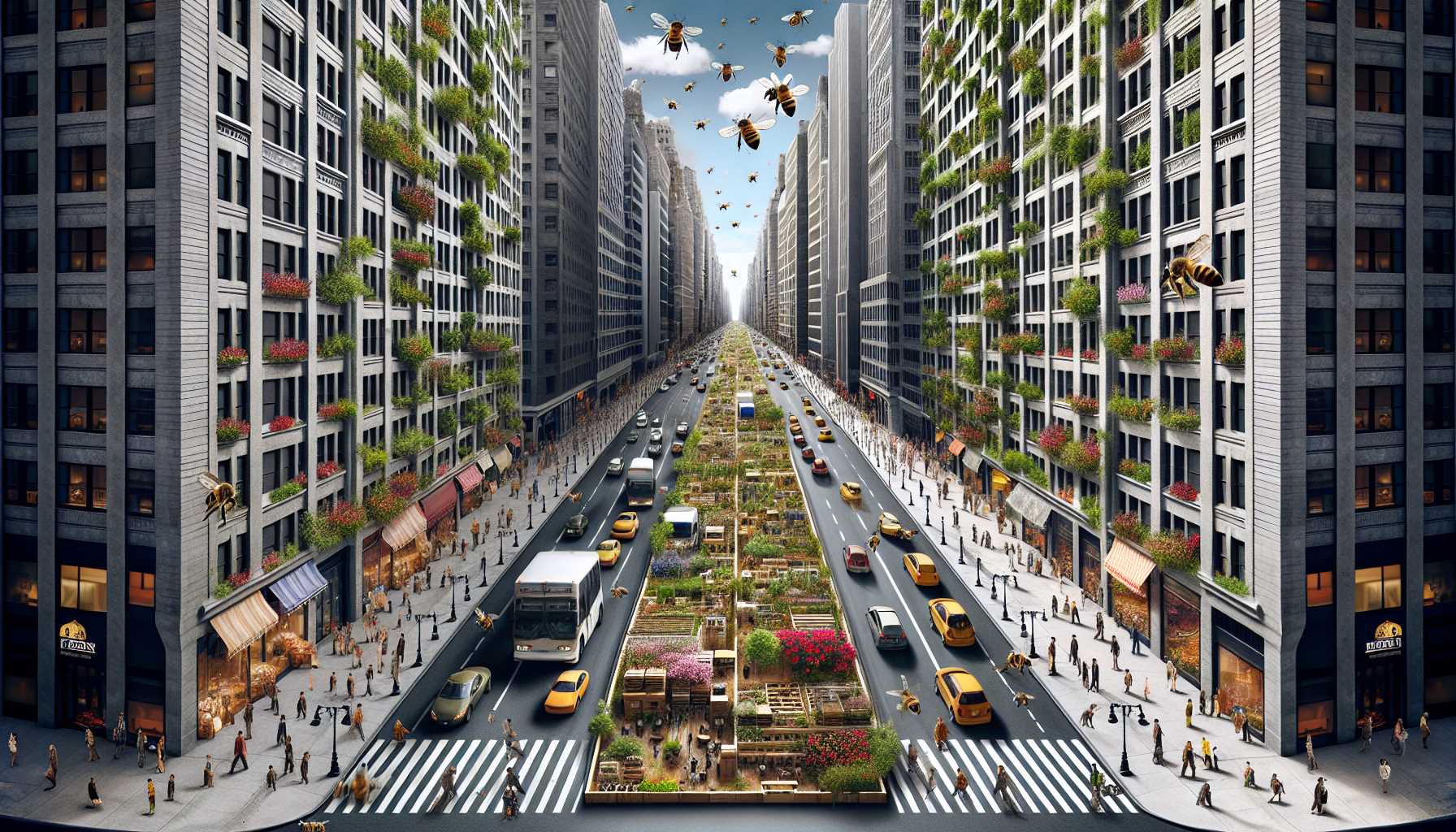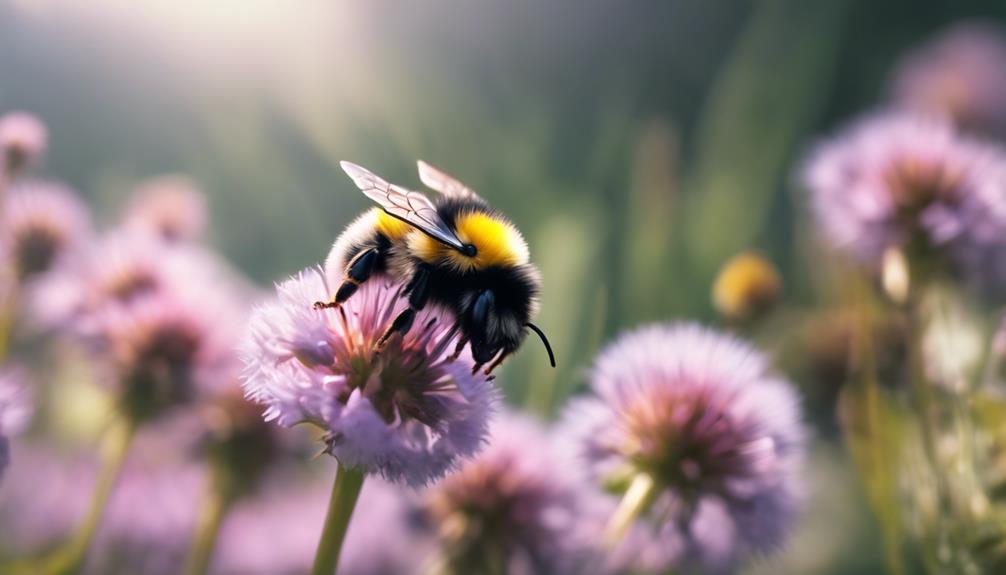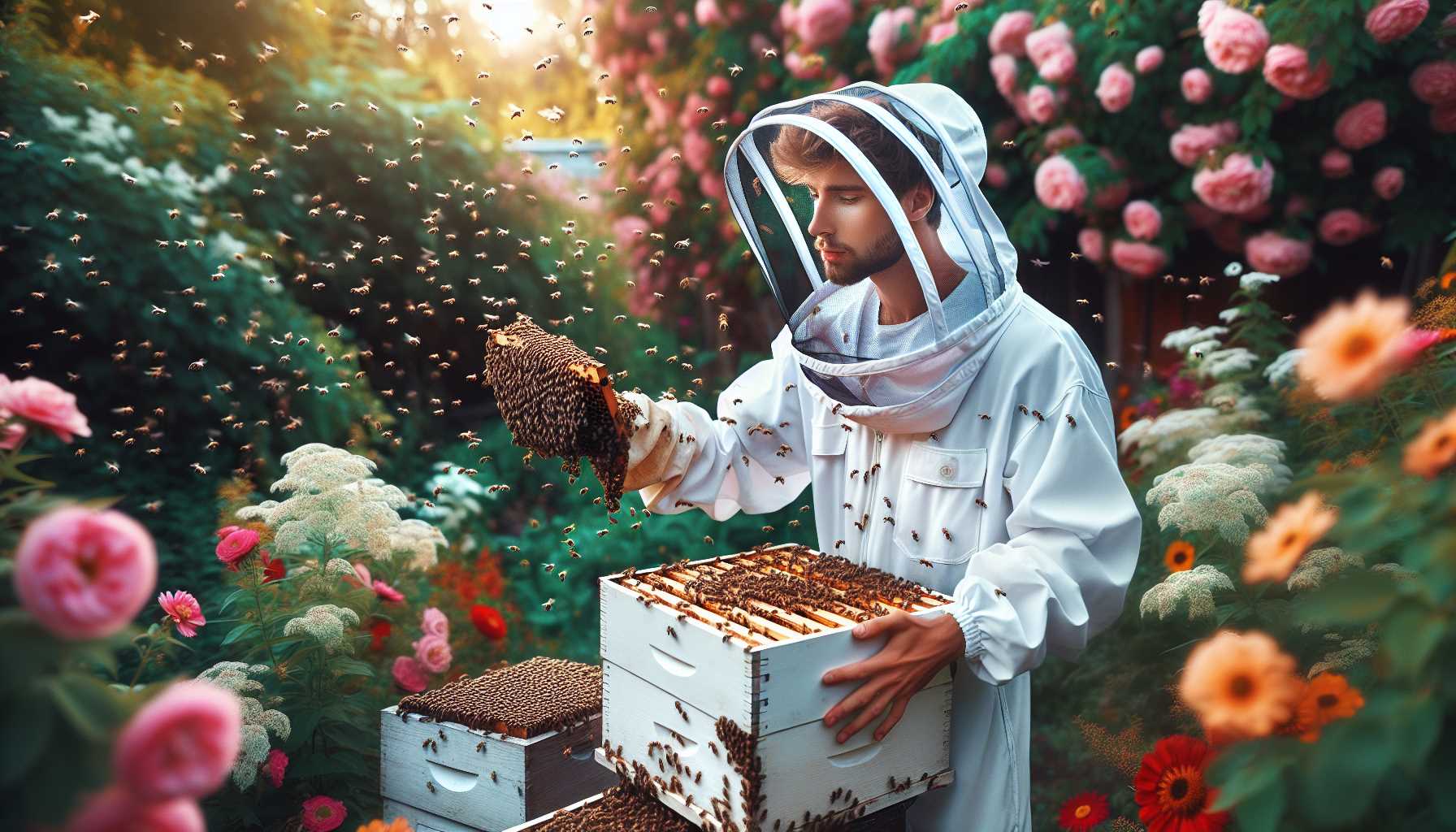Urban beehives are increasingly becoming a focal point in urban landscapes, but what exactly are they, and why should they matter to you? These miniature hives, nestled amidst the hustle and bustle of city life, play a crucial role in something much larger than themselves.
As we explore the intricate workings of these urban sanctuaries, a deeper understanding of their significance emerges, shedding light on the interconnectedness of ecosystems and human existence. The story of the urban beehive unfolds a narrative that goes beyond mere honey production or garden aesthetics, inviting us to contemplate our place in this intricate web of life.
Key Takeaways
- Urban beehives support biodiversity and ecological balance in cities.
- Urban beekeeping enhances pollination, promoting sustainability in urban agriculture.
- Bees play a crucial role in plant reproduction and genetic diversity in urban ecosystems.
- Urban beehives contribute to the vibrancy and productivity of urban landscapes.
Importance of Urban Beehives
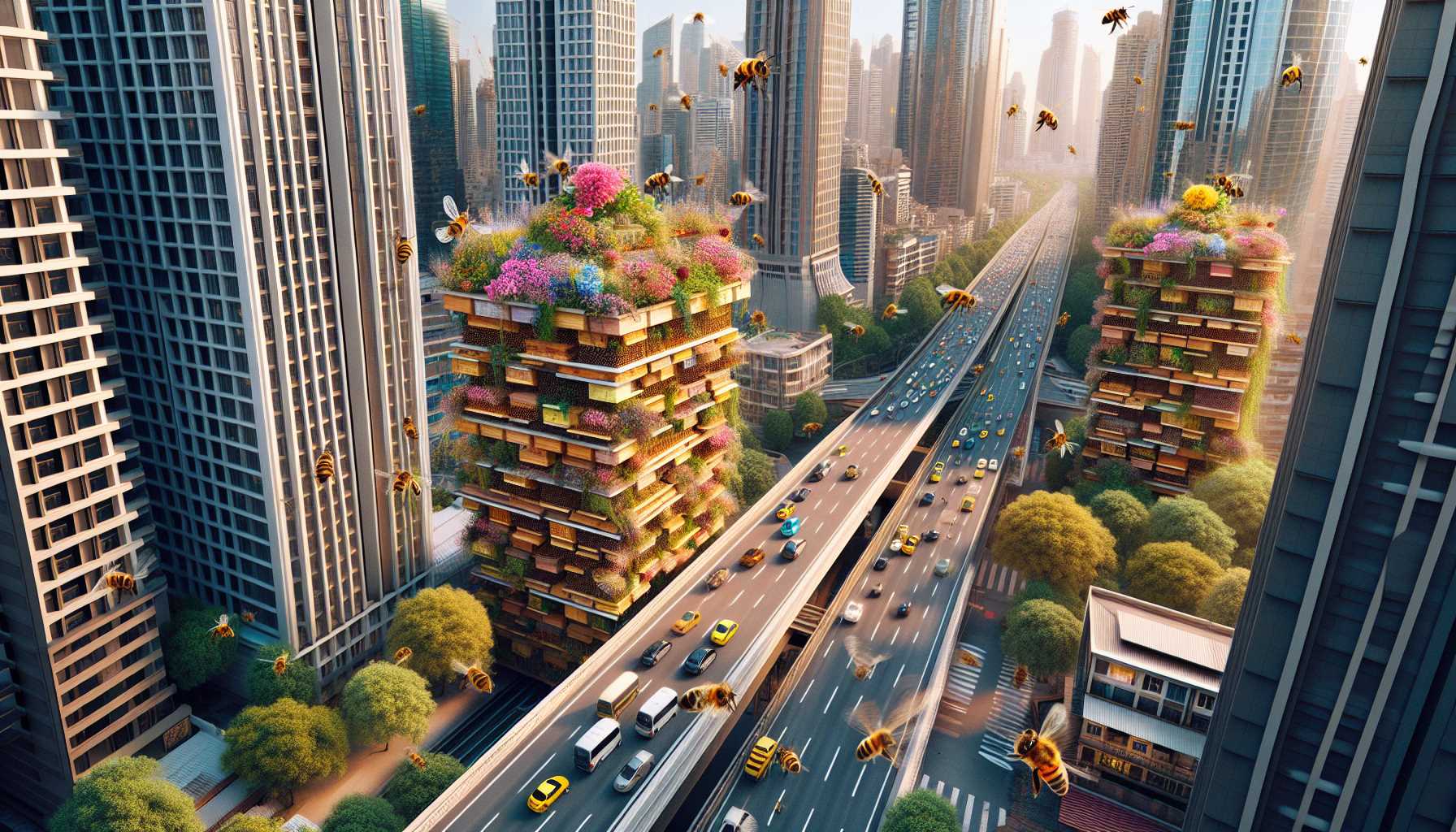
Urban beehives play a crucial role in supporting biodiversity and promoting ecological balance within city environments. As urban areas continue to expand, green spaces such as rooftop gardens are becoming increasingly important for maintaining urban biodiversity. Bees, as key pollinators, contribute significantly to the health and diversity of plant life in these spaces.
Rooftop gardens provide a unique opportunity for urban beekeeping by offering a variety of flowering plants for bees to forage on. This not only benefits the bees by providing them with a food source, but it also helps increase plant reproduction and genetic diversity. As bees move from flower to flower, they facilitate the transfer of pollen, enabling plants to produce fruits and seeds. This process is essential for the overall health of urban ecosystems and contributes to the sustainability of urban agriculture.
Benefits of Urban Beekeeping
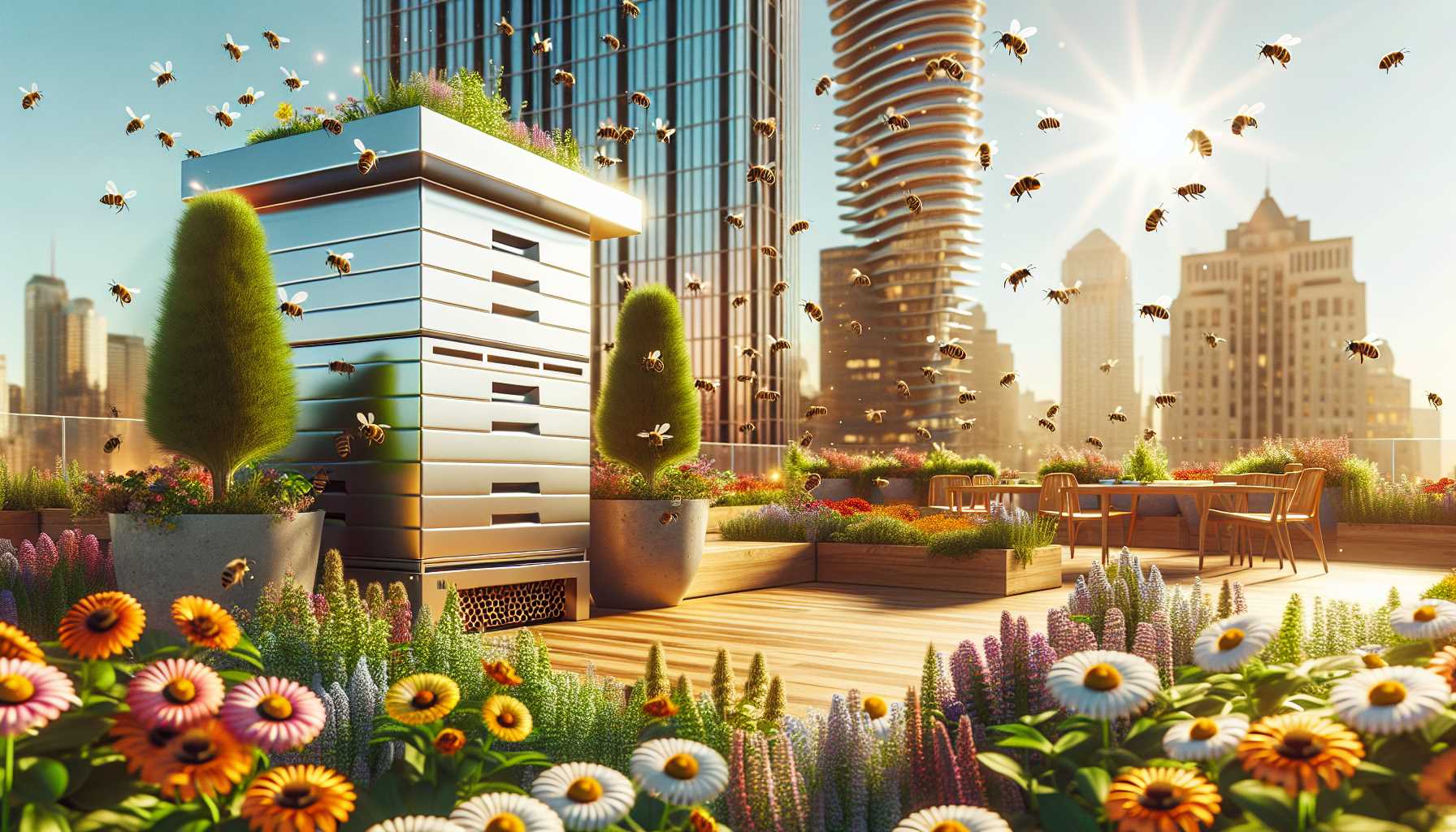
The practice of beekeeping in urban environments brings forth a myriad of advantages that extend beyond the boundaries of the beehive itself. Urban beekeeping offers numerous benefits that contribute to the well-being of both the local ecosystem and the community.
- Rooftop Gardens: Urban beekeeping supports the flourishing of rooftop gardens by enhancing pollination, leading to increased yields of fruits, vegetables, and flowers.
- Sustainability: By promoting the health of bee populations, urban beekeeping plays a vital role in ensuring the sustainability of urban agriculture and green spaces.
- Urban Agriculture: Bees play a crucial role in urban agriculture, facilitating the growth of crops and fostering a connection between city dwellers and the food they consume.
- Biodiversity: The presence of beehives in urban areas promotes biodiversity by supporting a diverse range of plant species, insects, and animals within the city environment.
Through the practice of urban beekeeping, communities can foster sustainable practices, support local agriculture, and enhance the overall biodiversity of urban landscapes.
Urban Beehive Impact on Pollination
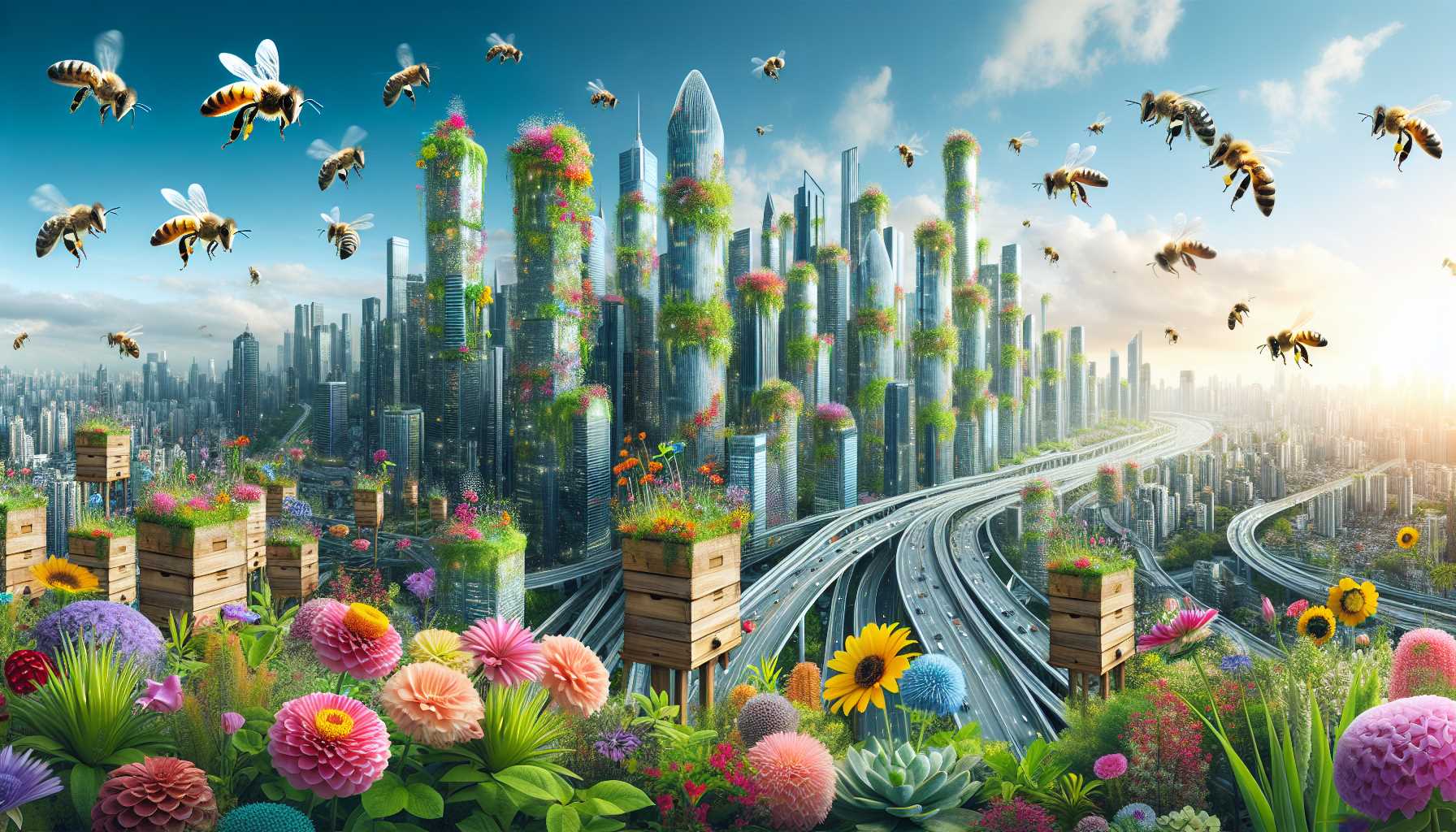
The presence of urban beehives plays a crucial role in enhancing pollination within cities, leading to increased biodiversity and healthier ecosystems.
Bees are essential pollinators that facilitate the reproduction of plants, ensuring the production of fruits, vegetables, and flowers in urban areas. This vital process not only supports local urban agriculture but also contributes to the overall sustainability and resilience of city environments.
Pollination in Cities
Enhancing the vibrancy and productivity of urban ecosystems, the presence of beehives in cities significantly boosts the crucial process of pollination. This vital activity not only supports the growth and reproduction of plants but also fosters a healthier environment for all urban dwellers.
- Bees visiting rooftop gardens and green spaces increase biodiversity by pollinating a variety of plant species.
- Pollination in cities helps sustain urban wildlife populations by providing food sources and habitats.
- Increased plant reproduction due to pollination enhances air quality in urban areas.
- Pollination contributes to the beauty of urban landscapes, making cities more visually appealing and vibrant.
Bees and Plants
Boosting urban ecosystems with their essential role in pollination, bees from urban beehives significantly impact the relationship between bees and plants, enhancing plant reproduction and biodiversity in cities. Bee behavior plays a crucial role in the pollination process, as bees visit flowers in search of nectar and pollen, inadvertently transferring pollen between plants and ensuring fertilization. This behavior is essential for the reproduction of many plant species, contributing to the diversity of plants in urban environments.
Urban Crop Production
In the realm of urban agriculture, the presence of beehives can significantly impact crop production through their essential role in pollination. Bees play a crucial role in pollinating plants, especially in urban settings where green spaces are limited.
The presence of urban beehives can lead to increased crop yields and better quality produce in various ways:
- Enhanced pollination efficiency: Bees ensure better fertilization of plants, leading to healthier and more abundant harvests.
- Support for rooftop gardens: Urban beehives can boost the productivity of rooftop gardens, contributing to local food production.
- Promotion of urban agriculture: By supporting pollination, beehives encourage the growth of urban agriculture initiatives.
- Contribution to food security: Increased crop yields from bee-assisted pollination can enhance food security in urban areas.
Sustainability of Urban Beehives
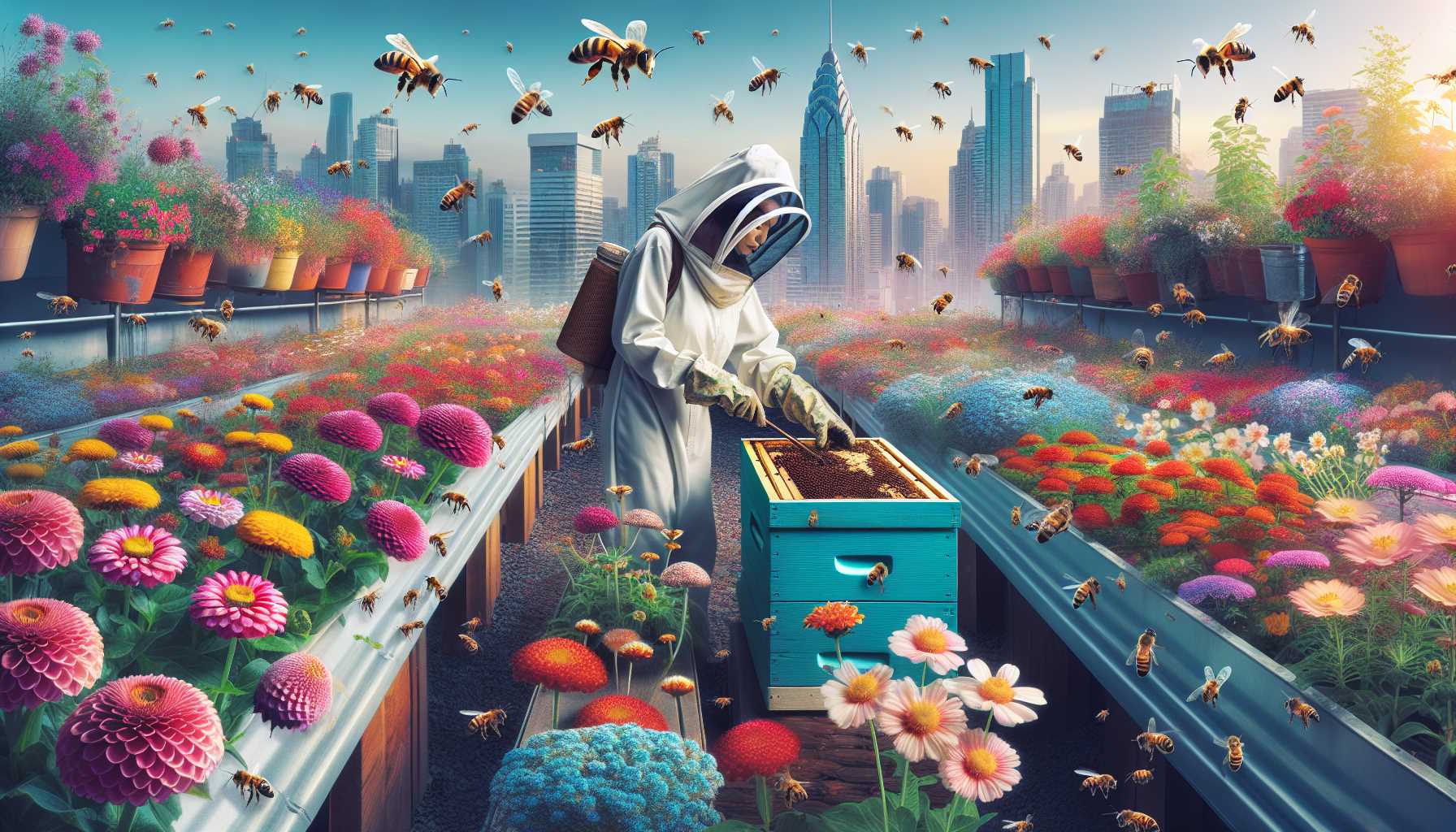
The sustainability of urban beehives is crucial for maintaining a healthy ecosystem within cities.
Understanding the impact of beehives on urban environments and the benefits of urban beekeeping can lead to more sustainable practices.
Beehive Impact on Cities
Urban beehives play a crucial role in enhancing the ecological diversity and sustainability of cities. When considering the impact of beehives on urban areas, several key points come into play:
- Beehive design: Innovations in beehive design allow for space-efficient and aesthetically pleasing structures that integrate seamlessly into urban landscapes.
- Urban landscaping: Beehives contribute to the flourishing of urban flora by aiding in pollination, leading to vibrant green spaces within cities.
- Beehive placement: Strategic placement of beehives in urban environments can optimize pollination coverage and support biodiversity.
- City infrastructure: Integrating beehives into city infrastructure promotes a more sustainable and eco-conscious urban ecosystem, benefitting both the environment and the community.
Benefits of Urban Beekeeping
With the rise of urban beekeeping practices, the sustainability of beehives in city environments is becoming increasingly recognized for its multifaceted benefits. In an urban environment, honey production from beehives not only provides a local source of this natural sweetener but also supports the overall health of urban landscapes.
Urban beekeeping plays a crucial role in enhancing biodiversity by helping to pollinate plants, trees, and flowers in cities, contributing to the flourishing of various species. By maintaining beehives in urban areas, beekeepers can help mitigate the decline of pollinators while fostering a more sustainable and vibrant ecosystem within city limits.
The presence of urban beehives not only benefits the bees themselves but also enriches the urban environment and the community as a whole.
Community Engagement in Urban Beekeeping
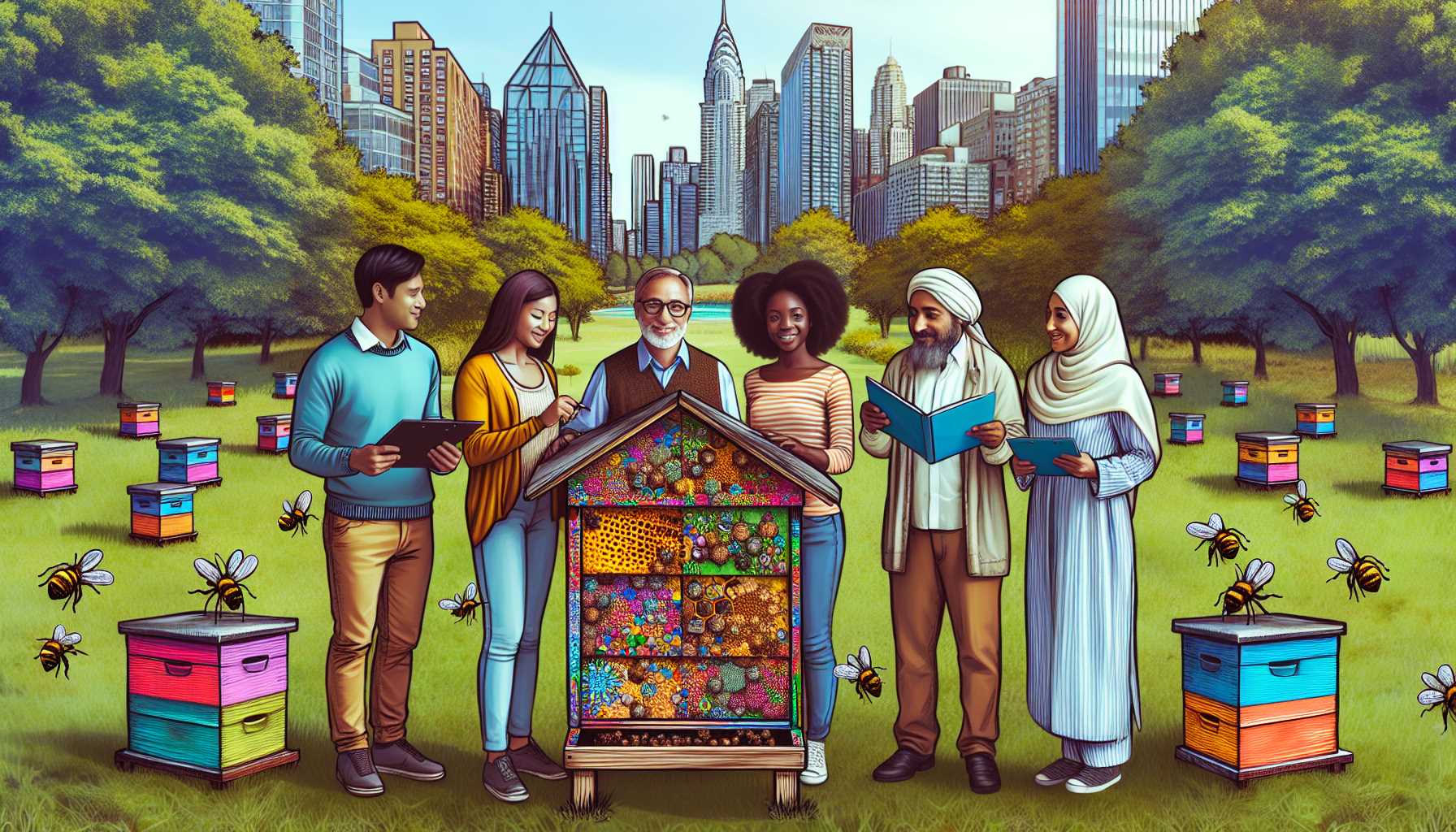
Engaging the community in urban beekeeping fosters a sense of environmental stewardship and connection to nature among city dwellers. Urban beekeeping not only benefits the bees and the environment but also provides an opportunity for people to come together, learn, and contribute to a sustainable cause.
- Community Gardens: Setting up beehives in community gardens promotes pollination and educates gardeners about the importance of bees in food production.
- Educational Workshops: Hosting workshops on beekeeping techniques and the role of bees in ecosystems can increase awareness and attract new bee enthusiasts.
- Volunteer Programs: Involving volunteers in hive maintenance and honey harvesting fosters a sense of ownership and responsibility towards the bees and their well-being.
- Public Demonstrations: Organizing public demonstrations and hive tours can showcase the inner workings of a hive, demystify bee behavior, and inspire more people to support bee conservation efforts.
Urban Beehive Conservation Efforts

Efforts to conserve urban beehives have become increasingly crucial in safeguarding the vital role that bees play in maintaining ecosystems and supporting biodiversity. Beehive placement in urban areas is a key strategy in protecting and promoting urban bee populations. By strategically positioning beehives in parks, rooftops, and gardens, cities can provide safe havens for bees to thrive amidst urban development.
Urban bee populations face numerous challenges, including habitat loss, pesticide exposure, and climate change. Conservation efforts aim to mitigate these threats by creating bee-friendly environments within city limits. Initiatives such as planting bee-friendly flowers, reducing pesticide use, and promoting sustainable beekeeping practices are essential in ensuring the survival of urban bee populations.
As urbanization continues to expand, the conservation of urban beehives becomes increasingly urgent. By raising awareness, implementing bee-friendly policies, and actively participating in conservation efforts, individuals and communities can contribute to the preservation of bees and the invaluable ecosystem services they provide. Ultimately, protecting urban beehives is not just about saving bees; it is about safeguarding the delicate balance of nature upon which we all depend.
Future of Urban Beehives
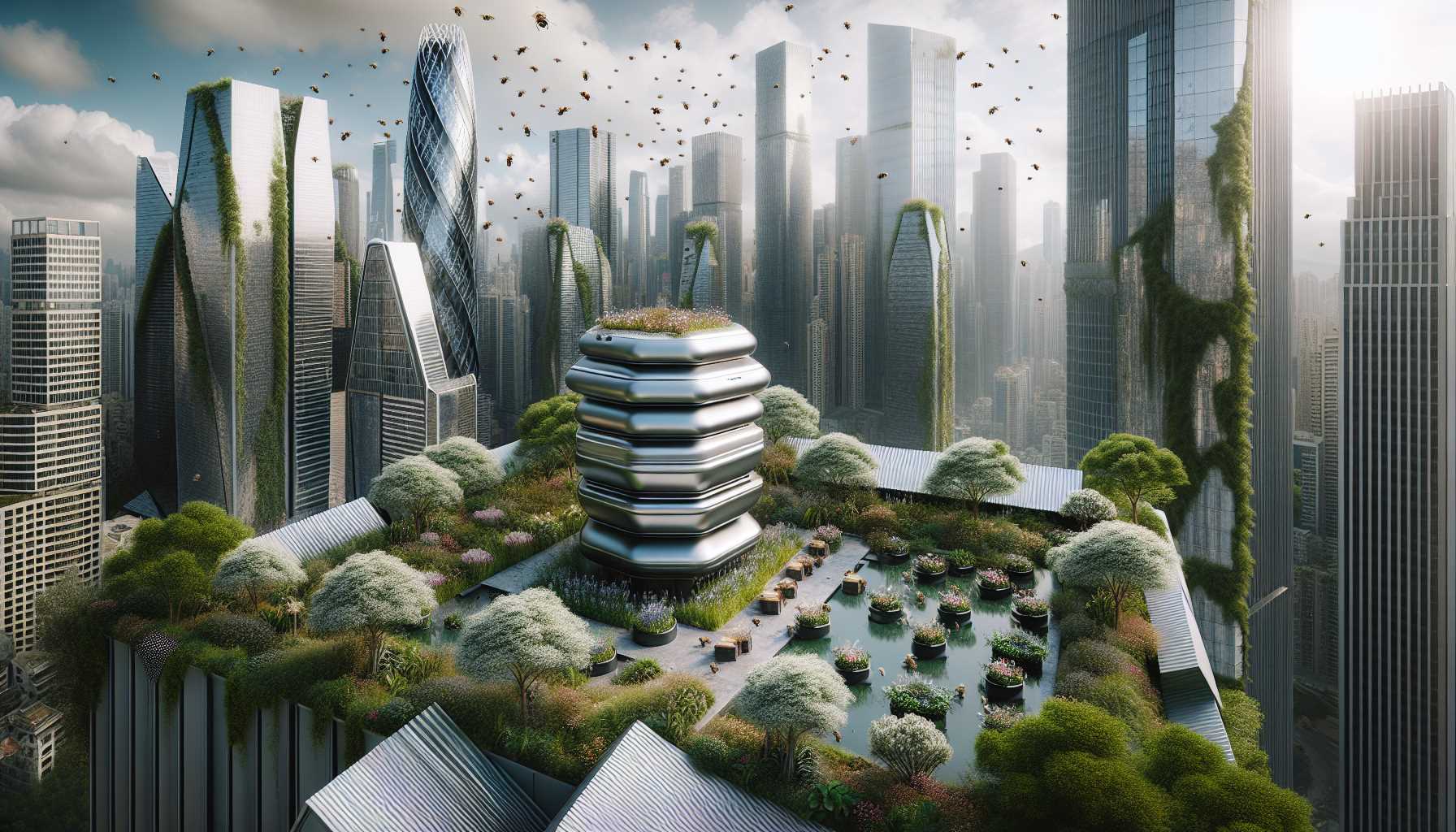
The evolution of urban beehives in response to environmental challenges and urban development underscores the need for proactive strategies to ensure the sustainability and resilience of bee populations in city settings. As we look towards the future of urban beekeeping, several key trends and advancements are shaping the way we interact with these vital pollinators:
- Hive design: Innovative hive designs are being developed to maximize space efficiency and bee comfort, promoting healthy and thriving colonies even in urban environments.
- Technology integration: The integration of technology in urban beekeeping practices allows for remote monitoring of hives, ensuring early detection of issues and timely intervention.
- Sustainable practices: Future urban beekeeping will increasingly focus on sustainable practices such as organic pest management and habitat restoration to create a harmonious environment for bees.
- Community involvement: Engaging urban communities in beekeeping activities fosters awareness and appreciation for these essential insects, creating a network of bee advocates in cities worldwide.
Frequently Asked Questions
Can Urban Beehives Attract Pests or Predators to Residential Areas?
Urban beehives can potentially attract pests or predators to residential areas, but proactive measures such as proper pest control and promoting urban biodiversity can mitigate these risks. Urban beekeeping can play a vital role in wildlife conservation efforts.
How Do Urban Beehives Impact Local Wildlife Beyond Pollination?
Urban beehives have multifaceted impacts on local wildlife beyond pollination. They can contribute to wildlife conservation efforts by providing habitats for diverse species. Additionally, they engage communities in environmental education, fostering a deeper connection with nature.
Are There Any Regulations or Guidelines for Setting up an Urban Beehive in a Residential Area?
When setting up an urban beehive in a residential area, it’s crucial to adhere to local zoning laws that regulate agricultural activities. Engaging with the community through communication and education can help foster a positive relationship and address concerns.
What Measures Can Be Taken to Ensure the Safety of Urban Beekeepers and Their Neighbors?
Safety precautions are vital for urban beekeepers and neighbors. Measures such as proper protective gear, regular hive inspections, and bee-friendly plantings ensure a safe environment. Community engagement through education and open communication fosters understanding and cooperation.
How Do Urban Beehives Contribute to the Overall Biodiversity of a City?
Urban beehives play a crucial role in boosting overall biodiversity in cities through pollination of urban gardens and green spaces. They foster community engagement and education on conservation, highlighting the interconnectedness of urban ecosystems.

Roger Thomas is a seasoned beekeeper and hive architect with a deep-seated passion for sustainable living. His fascination with bees has shaped his professional career, giving him practical and theoretical expertise in bee behavior, colony health, and optimal hive conditions. Roger’s technical skills shine in his bespoke hive creations that cater to the specific needs of diverse bee species, while his sustainable practices promote environmental balance and the wellbeing of the bee population.
As he continues his journey in beekeeping, Roger has become a dedicated advocate for responsible practices and an insightful educator in his field. His posts aim to inspire new beekeepers, underline the importance of sustainability, and showcase the remarkable contribution bees make to our ecosystem. Roger invites you to join him as he delves into the world of bees and the rewarding, honey-sweet art of beekeeping.
